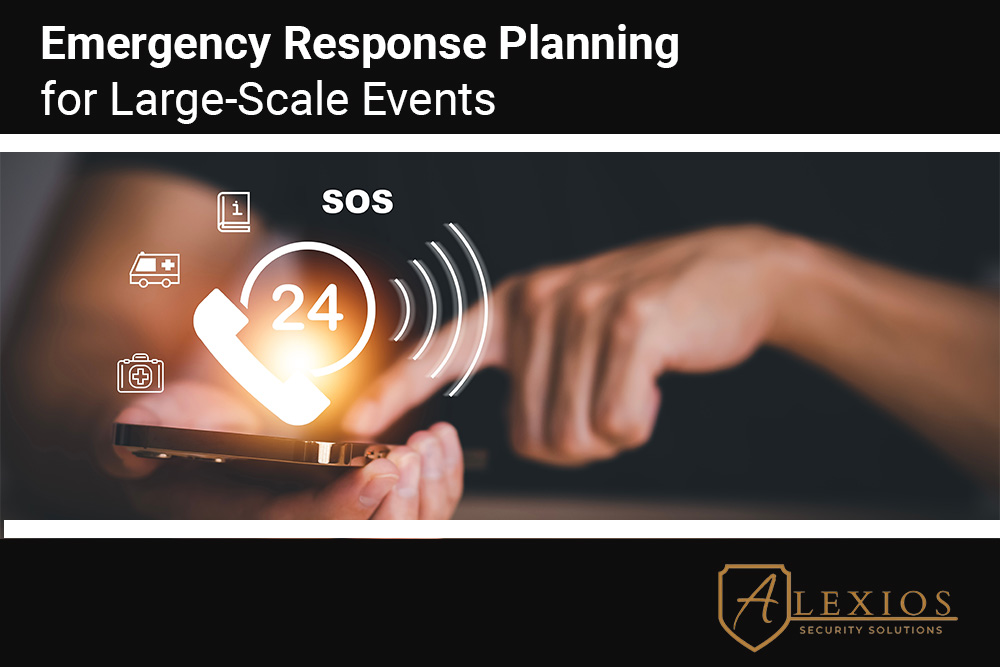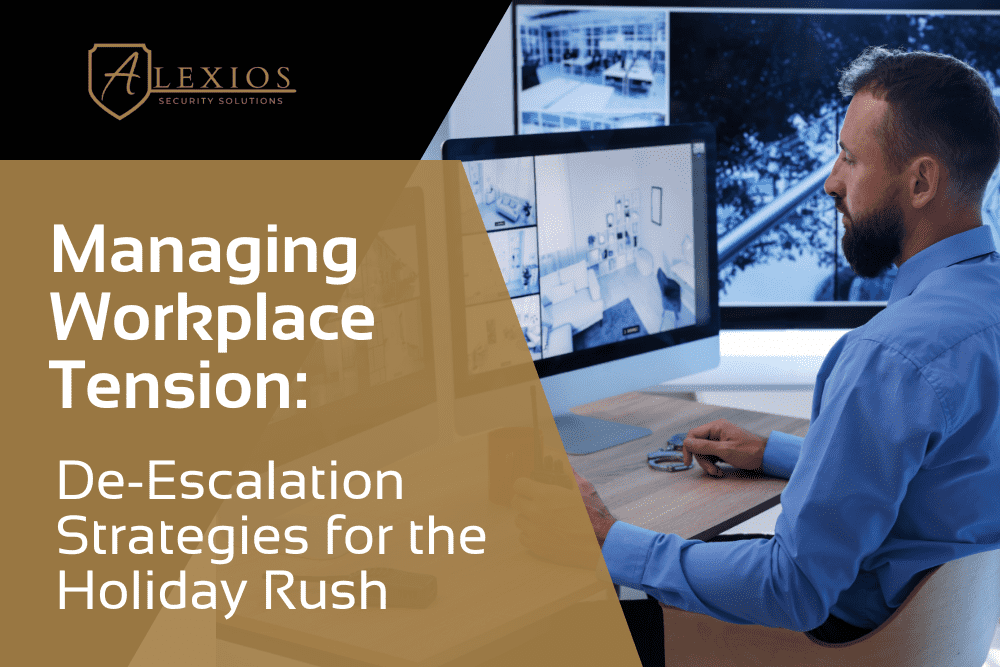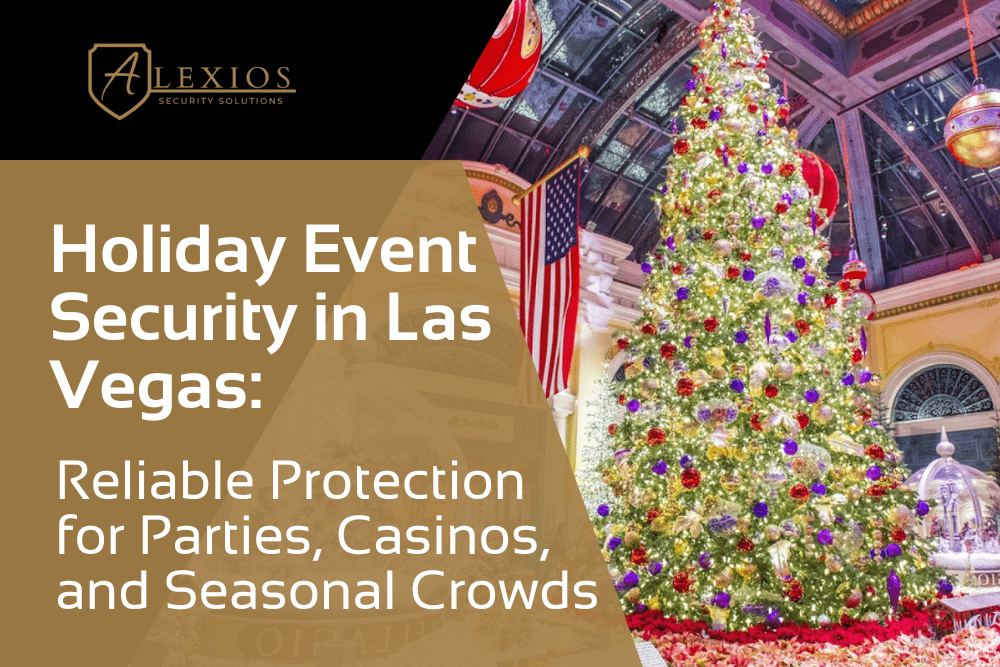
Alexios Security Solutions Response Planning
Although thousands of massive events take place without incident every year, large scale event safety is still very important. There are many things to do before, during, and after the event to ensure that everything goes smoothly and everyone remains as safe as possible at all times.
There is no exact or even agreed-upon number of participants that qualifies a gathering as a “large-scale event”. The term can also be different geographically, as an event containing 200 people in Las Vegas might not be considered large-scale but in a town of 500 residents, 200 would be considered huge.
Regardless of the exact number used, the advice contained here will apply to gatherings of any size. First, we’ll look at some issues that can arise with a large event and then we’ll discuss how to prepare for and react quickly and effectively if a negative event takes place.

Potential Issues During Events
A fire within the building is a major threat to any indoor gathering. It can be particularly dangerous as fires often spread quickly and can block multiple exits, especially in older buildings. Even something as small as a stray lit cigarette has caused many major fires at both residential and commercial properties over the years.
Violence is a top concern with any form of public gathering. This can be external, like a person or group of people entering with the explicit goal of causing harm to others, or internal, a conflict between attendees that escalates into a physical confrontation. It can also be the result of another event, like a fire that leads to trampling.
One that most people might not think about is the weather, which can pose several issues. This also applies to indoor venues, as lightning strikes, flooding in the parking lot or near the entrances, damage to the building itself, and much more can result in harm.
Another important consideration is the lead-up to the event. VIP transportation for top organizers and honored guests can help guarantee that everyone arrives safely and on time. It may be tempting to use rideshares like Uber or Lyft but they can be unreliable and offer a lower level of security than using a security services company.

Event Emergency Preparedness
Before the event begins, you’ll want to create an Event Emergency Response Plan. This is a document that lists possible emergencies that could arise, also known as a risk assessment, and how management and security should respond. Not only will this reduce the level of risk and response times but if a negative event does happen, it can reduce the legal burden on the organizers.
An important facet of the response plan is the level of event security that will be used. Contracting an external security services firm will provide multiple advantages, including reduced liability for the event organizers and the benefits provided by the advanced training they have no doubt received.
It is also recommended to have EMTs or other medical professionals on-site should a medical emergency take place. As the number of attendees for any event increases, so does the likelihood that someone will require medical attention at some point during the gathering and it’ll be best for everyone involved if a professional is available.
The response plan should also include a general, non-specific plan to be followed in case something unforeseen arises. All the planning in the world can’t stop freak accidents, unforeseen weather, or other potential disasters. However, it can make them more manageable and with the right planning in place, help everyone from VIPs to attendees make it out of the event safely.
The Importance of Communication
As with so many other aspects of life, communication is essential to crisis management for events. This refers to both internal communication between event leaders, staff, and security, as well as external communications (i.e., one or more of the aforementioned groups speaking to attendees).
Event organizers, workers, and security personnel should all have handheld radios for communication. Some organizers, especially those of a younger generation, may prefer to use cell phones for calls or text messages but this is not recommended. The event will probably be loud and the person you’re trying to reach may not hear the phone go off, leaving them unaware of a potentially threatening situation.
For external communication, there should be a way for a designated person or persons to communicate with everyone in the group. This is generally through the speaker system, probably either already installed in the building or outdoor speakers if it isn’t an indoor event.
Whoever addresses the crowd should be calm to avoid starting a panic but direct enough to make sure attendees know that something serious has happened. As part of the response plan, it may be a good idea to write out some scripted remarks that the speaker can read from, especially if the person who reads it is uncomfortable with public speaking.
There should also be a plan for communication with police, firefighters, and first responders if they’re called to the scene.

Large Scale Event Response Planning Tips
- Creating and adhering to an emergency response plan will help make sure that negative situations are contained as soon as possible.
- You may choose to elect someone to be in charge of communication with attendees, first responders, or even the media if things escalate to that point. However, there should also be at least one backup chosen in case the person designated is involved in the incident.
- Remaining calm is one of the most important measures to prevent attendees from panicking. No matter how severe the situation might appear, attendees should be aware that something serious has happened but know that everything will be taken care of.
- If the event is large enough, it might be a good idea to inform first responders in advance. Firefighters can increase their level of readiness and the police might offer either uniformed or off-duty officers to supplement existing event security.
- Indoor events should always adhere to the maximum occupancy set by the Fire Marshall. It may seem annoying and many people might feel that a couple extra people will be fine but if something does happen and everyone needs to leave in a hurry, it can present issues with overcrowding. Those limits exist for safety and should be followed.
- “Safety first” sounds like a clichéd sentiment but it is vitally important that it should be followed at all times. People may complain about safety “taking the fun” out of the event but it’s better to slightly inconvenience someone briefly than have them get seriously injured.
- Having a member of the organizing team take security training classes to help with emergency response planning events will benefit the company for years to come.
There are many elements to a large-scale event that make it a success but perhaps the most important is the emergency response plan. By finding solutions to potential issues before they occur, event organizers can make sure that everything goes smoothly and as safely as possible.






